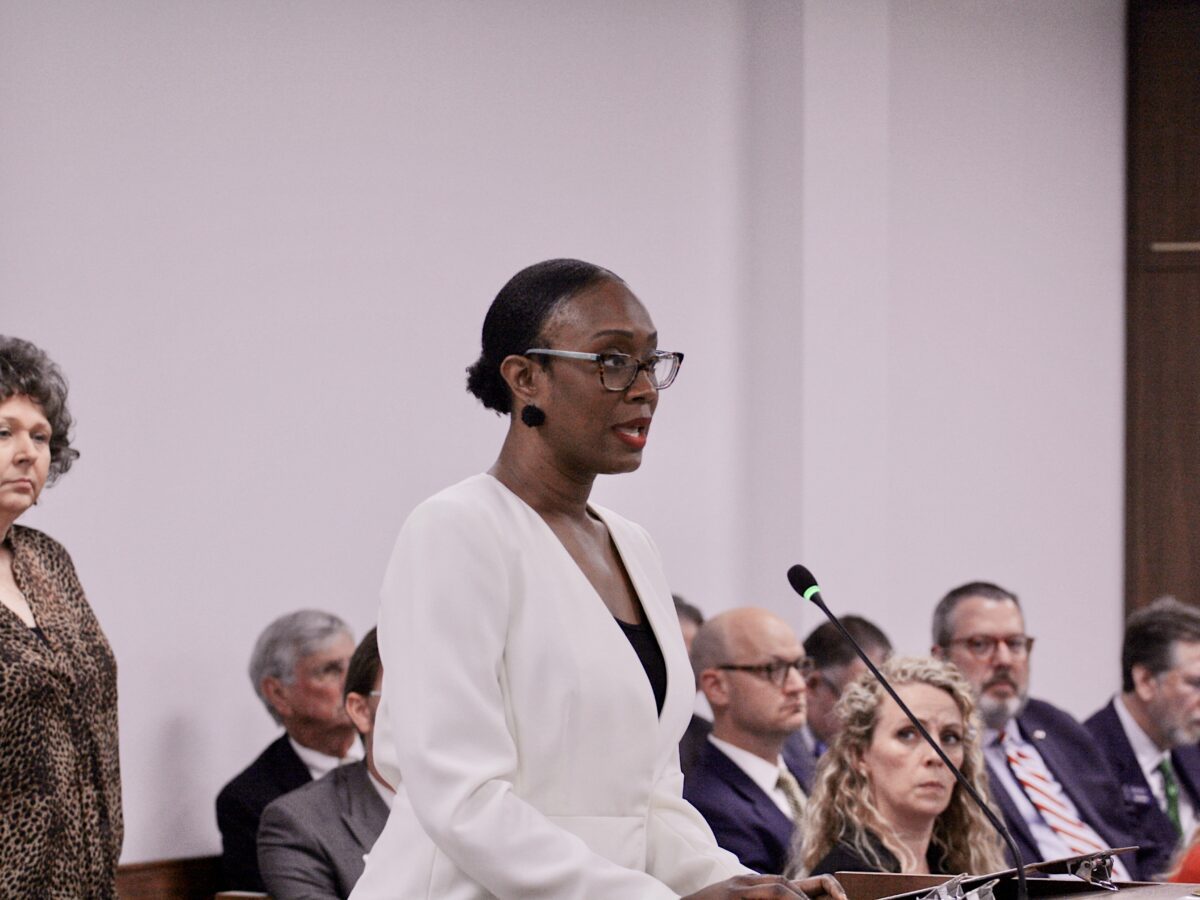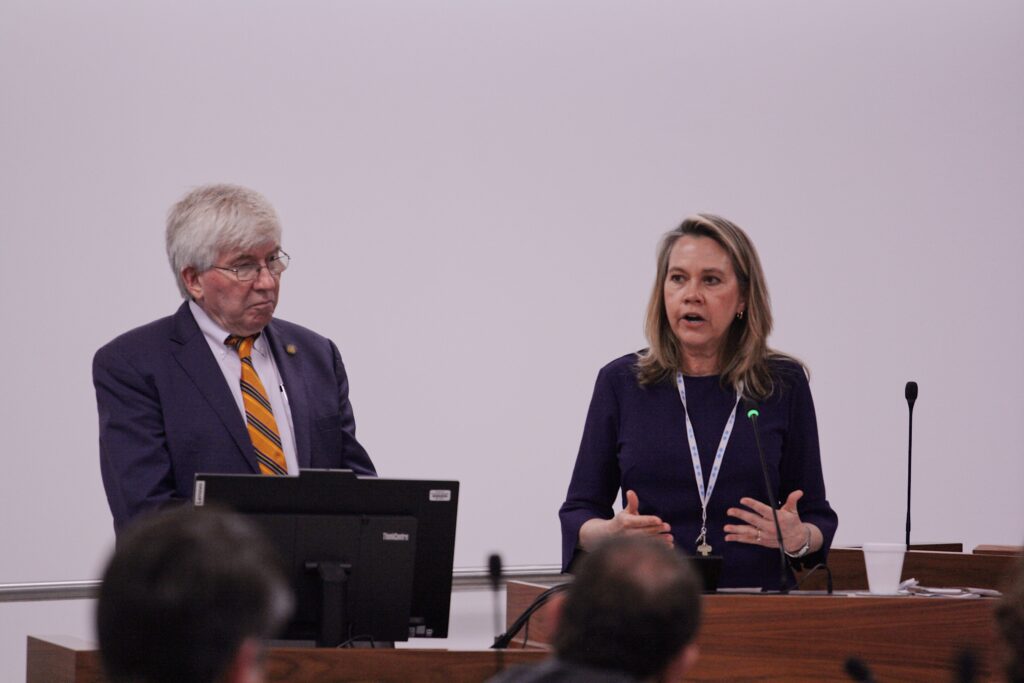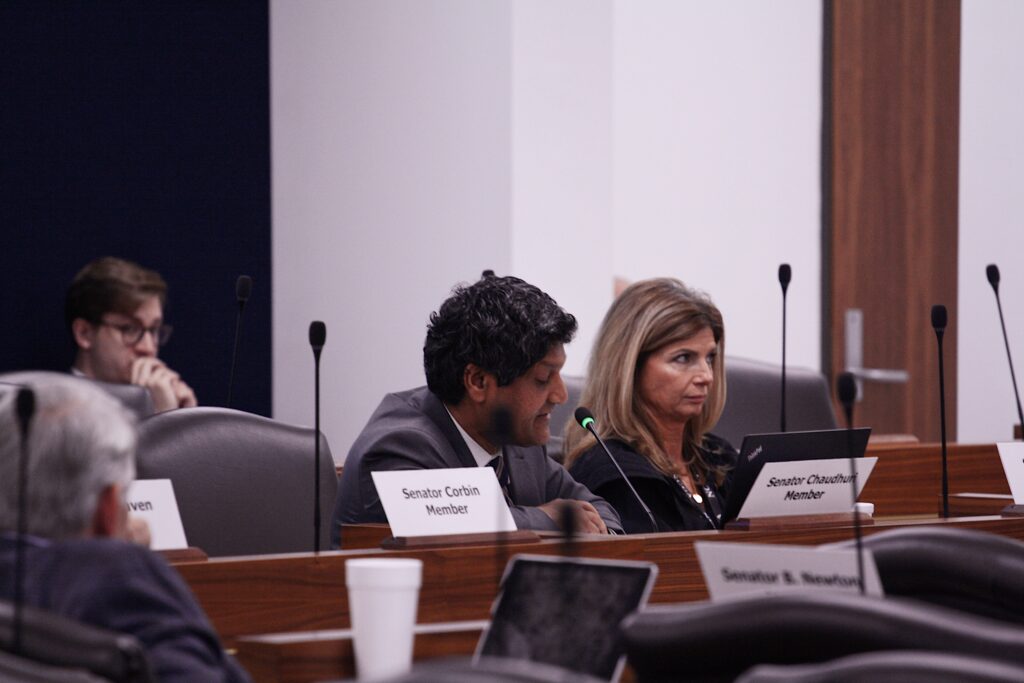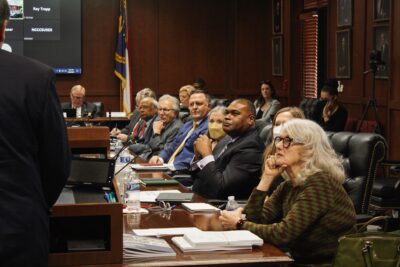

Share this story
- Among other things, SB692 would give the system president and Republican-led General Assembly more power. In turn, the bill would reduce the authority of the State Board of Community Colleges and take power away from the governor and local leaders. #nced
- Republican sponsors say the bill will create a more coordinated system to respond to workforce needs. Some critics of the bill view it as a harmful transfer of power. #nced
|
|
Update, April 20 at 12:00 p.m. – The rules committee gave a favorable report to SB692 on Thursday morning. Now the bill must go before the Senate.
As the N.C. Community College System (NCCCS) finalizes its search for a new system president, the Senate’s higher education committee gave a favorable report to a bill that would overhaul governance within the system.
Among other things, Senate Bill 692 would give the system president and Republican-led General Assembly more power. In turn, the bill would reduce the authority of the State Board of Community Colleges and take power away from the governor and local leaders.
“There are underlying issues with the community college system which must be addressed,” Sen. Amy Galey, R-Alamance, one of the bill’s sponsors, said at Wednesday’s committee meeting. “We have to be sure that our community colleges are as well positioned as possible to meet the needs of new employers. Our community colleges must be nimble, responsive organizations that are eager to interface with new businesses.”
Republican sponsors like Galey say the bill will create a more coordinated system to respond to workforce needs. On Wednesday, Galey identified two primary problems in the current system: the relationship between the system president and State Board of Community Colleges, and the “siloing” of the 58 colleges across the state.
Some critics of the bill view it as a harmful transfer of power. Others have questions about the bill’s impact on individual flexibility among colleges, the influence of students, and local representation.
Sen. Jay Chaudhuri, D-Wake, asked if the bill sponsors had heard from local boards. He raised concerns about the hundreds of new appointments for which state lawmakers will now be responsible, and told the News & Observer that a commission should have been formed to gather stakeholder input before proposing such sweeping changes.
“I think this bill has merit in reviewing and making recommendations for the governance of our community college system,” Chaudhuri said on Wednesday. “I would simply say that I think the bill removes community from the community college by transferring appointments from the local school board of trustees to the legislature.”
Galey, along with the bill’s other primary sponsors, Republican Sens. Todd Johnson and Tom McInnis, acknowledged some of these concerns.
“Not everybody loves it,” Galey said. “There’s some people who have entrenched interests and want to keep those interests. But overall, I think this is a vast improvement over what we have.”
On Wednesday, the committee approved two amendments to the bill.
The first amendment included two technical corrections.
The second amendment, proposed by Sen. Bobby Hanig, R-Bertie, included two changes. First, that the system president can only dismiss local presidents due to causes listed in their contract – a new power – and that local presidents can appeal such dismissals. Second, that local boards of trustees can choose to include a student representative on their board.
The original bill removed student representatives from local boards and the State Board of Community College. As of Wednesday, SB692 still does not include a student representative on the Board. Under the bill, the Board would not have a student after July 1, 2023, when the Board would shrink to 21 members from 22.
LaTasha Bradford, who is the Board’s current student member and president of the North Carolina Comprehensive College Student Government Association (N4CSGA), asked bill sponsors to reconsider the removal of a student member. She was accompanied by several other Board members.
Currently, the N4CSGA serves as a student liaison to the Board as a non-voting member. During public comments, Bradford named examples of past student influence, including the development of statewide child care grants, college food pantries, and mental health supports.
“This type of work is positive, transformative work … (that) happens with the intentional inclusion of student representatives on both the local and state level,” Bradford said. “I respect the work that is currently being done on this particular bill, and I thank you for the most recent amendment concerning the students. However, I humbly request the consideration of reinstating and solidifying the students seat at all 59 tables in this state – the local campuses and the State Board.”
The bill now goes to the Senate rules committee.


What else does the bill say?
Under SB692, the State Board of Community Colleges would still select the system president, but their choice would be subject to confirmation by the General Assembly. According to the bill, “the person elected by the State Board shall not serve as President but may serve as interim-President until the General Assembly adopts a joint resolution.”
On Wednesday, Hanig said that “with the increased responsibility of the new president, I hope we can find a few coins on the couch to get the pay right so we’re attracting the right person.”
The Board’s search committee met with the firm Buffkin/Baker for the first time in December, and posted the job for a new system president on Jan. 10 – listing a preferred start day of May 31, 2023. The presidential search follows former President Thomas Stith’s resignation in July. Stith was the sixth North Carolina Community College System (NCCCS) president in seven years.
Powers of system president
The system president would also gain several new powers under the legislation:
- Increased budget authority.
- The opportunity to provide reports to the General Assembly without approval of the Board.
- Making a formal recommendation either approving or denying the local board’s choice of a college president to the State Board of Community Colleges. Currently, the Board approves the hires without the system president having a formal role. At that time, the State Board would also have to set “mandatory contract terms” for all CEOS, or local presidents. A new campus CEO could receive at most a four-year deal.
- Ability to terminate the contract of individual college presidents for noncompliance with their contract terms. Following Wednesday’s amendment, a local president can now appeal their dismissal.
- Authority to recommend the removal of individual trustees at the local college level.
“The president of the Community Colleges System needs to be able to run the system,” said Sen. Todd Johnson, R-Cabarrus, according to a release from the Senate Republican press office. “The State Board will be able to focus on the policy decisions it should make instead of being tied up by tasks best performed by the System President.”
Sen. Joyce Waddell, D-Mecklenburg, asked on Wednesday for examples of when the current NCCCS structure hasn’t worked well. Galey said she was reluctant to speak about actual situations because people weren’t present to speak up for themselves.
“But that doesn’t keep us from making an observation that the structure needs to be improved upon,” Galey said.


Board appointment process
The makeup of the State Board of Community Colleges appointments would also shift under the bill. At present, the governor, House, and Senate all make selections to the Board. Under SB692, the governor would lose appointment power (he currently has 10 appointments).
On Wednesday, Democratic Senators Chaudhuri and Natasha Marcus raised concerns about the removal of the governor’s power.
In response, Galey cited language from the state’s constitution, which says the General Assembly “shall provide for the selection of trustees of The University of North Carolina and of the other institutions of higher education.”
“I don’t think that we should pick and choose which parts of the constitution we want to follow,” Galey said. “So if the Governor wants to be able to make those appointments, then he can propose a constitutional amendment and seek that.”
Current Board members would not be removed from their seats, but a new appointment system would take effect moving forward. Under SB692, the Senate and the House would each have nine appointments.
The lieutenant governor, treasurer, and secretary of labor would remain ex-officio members until 2027, when the Board will shrink to 18 members appointed entirely by the House and Senate.
Local boards of trustees would also be reshaped moving forward. At present, colleges have varied appointment processes with the governor, legislature, county commissioners, and local boards of education, each making appointments depending on the college.
This bill would create a singular process, with the governor and local school boards would lose their rights to appoint four members apiece.
Every college would have 12 members (from 13) on their board of trustees, with eight members appointed by the General Assembly, and the remainder appointed by the county commissioners in the county where the college is headquartered.
“If the administrative area of the institution is composed of two or more counties, the trustees shall be elected jointly by the boards of commissioners of all of those counties, each board having one vote in the election of each trustee,” the draft bill says. “The county commissioners of the county in which the community college has established a satellite campus may elect an additional two members if the board of trustees of the community college agrees.”


Other community college legislation
SB692 comes as NCCCS leaders have asked for increased funding from the state to expand workforce-training capacity. The system’s legislative request of $232 million over two years includes $86.8 million for a 7% salary increase for faculty and staff and $145.88 million for student investment.
On March 29, House Republicans released a proposed budget for the biennium, including $1.5 billion for NCCCS in both years of the biennium. Those funds included a 7.5% across-the-board salary raise over two years, $25.9 million in recurring funds in both years toward faculty recruitment and retention, and several workforce-related items. You can read more about the budget proposal here.
SB692 was also filed around the same time as several other bills related to community college.
The bill was filed one week after McInnis filed an amendment to HB149 that would require the same president selection process as SB692. That bill was then rolled into SB692.
On Tuesday, Rep. David Willis, R-Union, also filed HB715, “an act to modernize, restructure, and evaluate the University of North Carolina System and the Community College System.”
That bill would require community colleges to “ensure efficient use of institutional resources and report on steps taken.” It would also require the State Board of Community colleges to adopt a policy setting minimum enrollment requirements for all classes.
Among other things, the bill eliminates academic tenure and establishes a uniform hiring process for faculty, prohibits the use of higher education funds “for certain extracurricular purposes,” and mandates a unified admissions application for all community colleges. The bill also seeks to improve the Career and College Promise Transfer Pathway program.
Finally, the UNC System and NCCCS would also be required to study and jointly report “on the administrative services provided by each educational institution,” as part of an efficiency study.
Here are a few other bills involving community colleges:
- HB601, “Comm. Colleges Funding & Accountability Study,” is an act to “direct the State Board of Community Colleges to study and report on options for improving the current funding model and accountability measures for community colleges.”
- HB640, “Career Path Options Transparency Act.” This bill would mandate a website with information for students and parents “to assist in selection of major and career options in the State and in each prosperity zone of the State” to be updated annually. Among other things, such information would include tuition cost, average loan debt, and average/median salary among graduates from community colleges.
- HB767, “Expanding Workforce and Education Act.” This bill would “expand North Carolina’s workforce by providing in‑state tuition to North Carolina high school graduates who meet certain criteria.”
- HB769, “DES Employment Outcome Data Sharing.” This bill would authorize the division of employment security to share employment outcome data with the NCCCS.
- HB705, “Build Safer Communities and Schools Act.” As part of this bill, the North Carolina Justice Academy and the NCCCS “shall develop a memorandum of understanding to allow community colleges throughout the State to provide training and education to those individuals trained and educated by the North Carolina Justice Academy.”
Behind the Story
This story includes context originally reported by Nation Hahn in his article, “Governance shifts proposed for community college system.”





